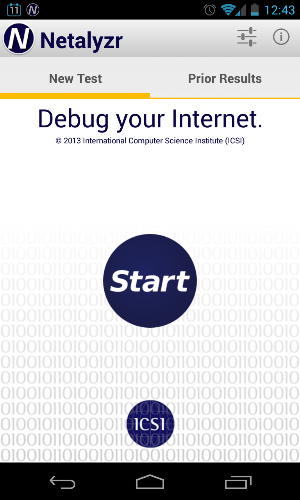Netalyzr Releases App for Android Smart Phones
Netalyzr, ICSI's popular online tool that analyzes how open and transparent a user's connection to the Internet is, can now test the network connections on Android smartphones through an app released today on the Google Play store. Netalyzr is developed and maintained by Networking and Security scientists Christian Kreibich, Nicholas Weaver, and Professor Vern Paxson, who leads networking and security research. Narseo Vallina Rodriguez, a postdoc in the group who joined ICSI this summer, and Matt Zavislak also helped develop the app.
Netalyzr tests several indicators of an Internet connection's health. For example, it checks whether a user's IP address is on a spam and malware blacklist - which, on a home network, may indicate that a machine on the network is infected.
Other tests analyze the degree to which an Internet service provider, or ISP, interferes with a user's connection. For example, if you type a Web address that doesn't exist in the URL bar of your browser, you should receive a page saying the address doesn't exist (or, depending on the browser, another page such as a Web search). Some ISPs, however, "wildcard" such errors by sending your request to a domain name system (DNS) that directs you to advertisements - and the ISPs consequently turn a profit off your error.
It also tests whether a network blocks certain communication protocols, including SSH, used to log into remote machines, and FTP, a method of transferring large files. Netalyzr initiates communications that use these ports from the user's machine to the Netalyzr server and tracks whether the communications come through. ISPs block some kinds of communications because they are commonly exploited by viruses, which is the case for SMB, a protocol used to share files. Some wireless hotspots block remote DNS servers, restricting users to the hotspot's DNS service.
Other tests include measurements of network buffer, bandwidth, and background health, which affect network speed and functioning. Netalyzr users can also directly share their own sessions and forward results of problem sessions to others for assistance.
Netalyzr went live in 2009. Since then, people have used it more than 1 million times to analyze their connectivity from some 600,000 IP addresses. The smartphone app will broaden its reach to both cellular and WiFi networks that users connect to as they travel throughout the day.
Data collected from Netalyzr sessions has been the basis of an increased look at bufferbloat, the overuse of buffering inside a network that can result in slow connections. Researchers also used Netalyzr data in tracking the behavior of certain ISPs that redirected customers' Internet searches into affiliate marketing programs, for financial gain.
The Internet Society has recommended Netalyzr as one of four end-user tests that determine what problems users may encounter with IPv6, the new Internet protocol address standard. The popular Internet game League of Legends also recommends it as a debugging tool.
Related links:
Netalyzr app in the Google Play store
Netalyzr for desktop machines
New Scientist article on Netalyzr results

